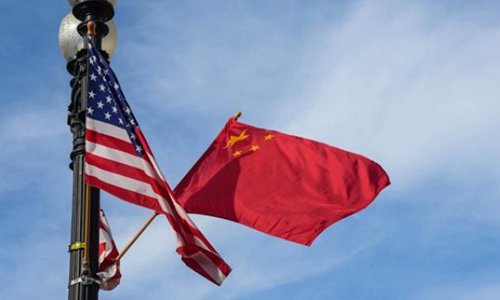China warns US of tariffs backlash
US pressure could scuttle next round of negotiations: analysts

Photo: Xinhua
China on Friday vowed necessary countermeasures to safeguard its core interests after the US threatened to impose 10 percent in tariffs on another $300 billion in Chinese goods, saying that the country will not accept any extreme pressure threat and blackmail, nor "make any concession" on issues of principle.
China strongly opposes the new US tariff announcement as it violates the consensus reached by their top leaders in Osaka, Japan, said the Chinese Foreign Ministry and Commerce Ministry, both calling on the US to timely correct the wrong doings, otherwise "all the consequences will be borne by the US."
The ministries urged the US to return to the right track to address issues through talks based on equality and mutual respect.
Adding tariffs is definitely not the correct way to resolve economic and trade frictions, Chinese State Councilor and Foreign Minister Wang Yi told reporters on Friday, on the sidelines of a meeting with Southeast Asian foreign ministers in Bangkok, Thailand.
The new tariff threat is the Trump administration repeating a bullying tactic, which also shows that the US is getting anxious to reach deal with China, experts said, noting that it will not scare China, but bring mounting challenges to the US economy.
The surprise tariff announcement came after the two countries restarted trade consultations in Shanghai on Wednesday, the first round since talks collapsed in May.
"The US will start on September 1 an additional tariff of 10 percent on the remaining $300 billion in goods from China into our country," Trump tweeted Friday morning - an escalation in the trade war that has dragged on for more than a year.
This does not include the $250 billion already tariffed at 25 percent, he said.
The US sought to press China during the preparation period for the next round of trade talks, which both sides confirmed will take place in Washington in early September, experts said, noting it is "impossible" for China to give in.
The sudden tariff announcement will cast a shadow on succeeding meetings between the two countries, they said, implying that if the US insists on applying the tariffs, China would consider dropping consultations in August.
Chinese and US working teams will be in close contact in August to prepare a "good groundwork" for trade talks in September, the Chinese Commerce Ministry said.
China was fully prepared for extreme situations in trade talks in the past year, Mei Xinyu, a veteran analyst close to the Ministry of Commerce, told the Global Times on Friday.
Trump is not happy with the progress in trade talks as they are not as fast as he expected, but the Chinese government has its pace, and cannot work the way the US wants, said Wang Xiaosong, a professor at the Renmin University of China.
China will likely have more weapons to fight back, and the unreliable entity list that is being mulled could be an important tool, Wang said.
Given Trump's new threat, it's possible that China would halt some purchases of US products, and China's countermeasures will not be limited to trade, said Mei.
Chinese purchases of US farm goods remained a concern during the trade dispute, as Trump tweeted that China agreed to buy "in large quantities, but did not do so."
The White House called the talks in Shanghai "constructive," saying China confirmed its commitment to buy more US agricultural products.
The Chinese Ministry of Commerce confirmed Thursday that millions of tons of US soybeans have been shipped to China since July 19, and many firms have made orders for US soybeans, cotton, pork and sorghum.
It seems that the agricultural purchases from China did not meet Trump's demand, but the 10 percent tariff has no great impact on Chinese export companies as it can easily be absorbed, Gao Lingyun, an expert at the Chinese Academy of Social Sciences, told the Global Times on Friday.
"Trump is really getting anxious to reach deal with China, and the ball is now in China's court," Gao noted.
"Nobody is benefitting from this trade war. Trump thinks that China's loss is the US' gain. This is Trump's very primitive mentality. He believes in a zero-sum world. This view is profoundly incorrect and very dangerous," Jeffrey Sachs, director of the Center for Sustainable Development at Columbia University, told the Global Times on Friday.
US lack of confidence
Trump's threat of new tariffs hit global markets hard, adding increased instability and uncertainty, and would cause a global recession and backfire on the US, experts said.
Market players will realize that the threats had no significant impact on Chinese exporters and industrial producers, but the US financial sector will face turmoil, Mei said.
US stocks opened lower on Friday, extending their losses into a fourth day, on lingering concerns over a new US tariff threat. The Dow Jones Industrial Average dropped 0.27 percent, the S&P 500 slid 0.35 percent and the NASDAQ Composite shed 0.63 percent.
Chinese mainland shares narrowed losses on Friday, with the benchmark Shanghai index down 1.41 percent to under 2,900 points, the Shenzhen Component Index falling 1.42 percent, and the smaller ChiNext market index dropping 1.09 percent.
Rare earths posted strong gains and all 25 stocks listed on the NASDAQ-style STAR Market closed higher. China once indicated that it will keep its options open for using rare-earth minerals as a weapon in an escalating trade war.
Since the US economy is much more dependent on its financial sector, the impact on the US will be far greater than on China, Mei said. The economy is Trump's ace in his 2020 re-election bid, Mei said.
The economy is Trump's ace in his 2020 re-election bid. However, if a recession breaks out during the presidential campaign, Trump will lose his chance, Mei said.

